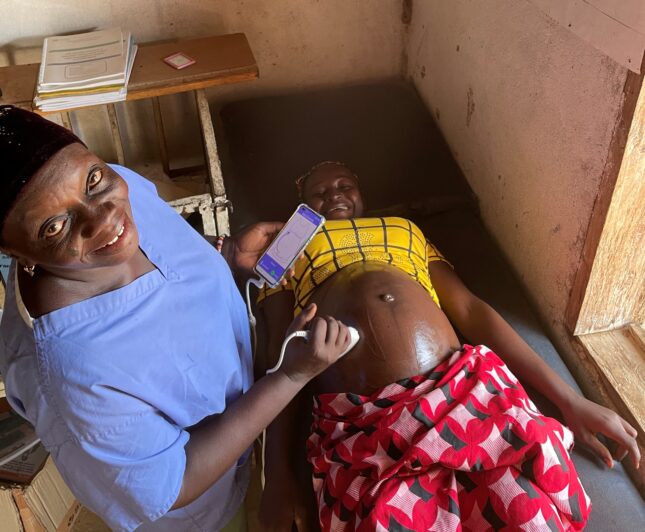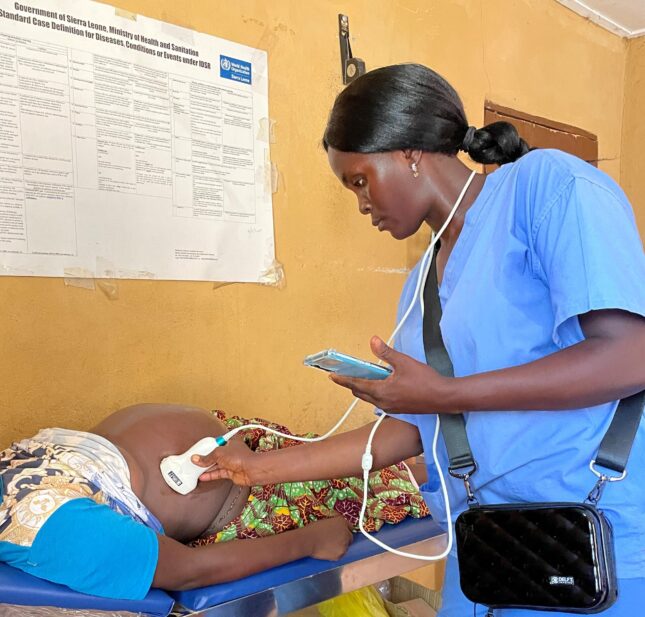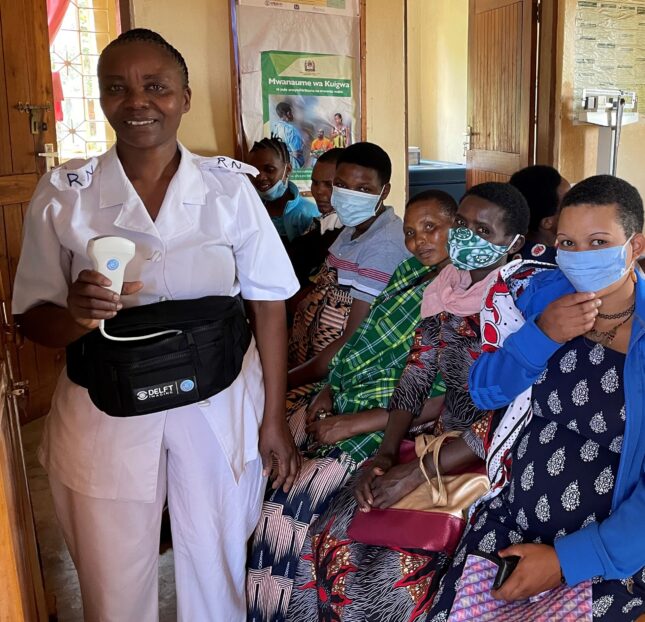-
Dot-Mom // Eye On // Guest Contributor
BabyChecker: Bridging the Gap in Maternal Care, One Scan at a Time
February 7, 2024 By Katyayini Singh
We live in a world marred by healthcare disparities. Pregnancy-related deaths and disabilities remain unacceptably high. Nearly 800 women die each day due to preventable causes related to pregnancy and childbirth, and scores more suffer from lasting disabilities. Shockingly, 90% of these preventable deaths occur in low-resource settings.
The World Health Organization (WHO) acknowledges the vital role of ultrasound during antenatal care (ANC) visits to help reduce preventable deaths. Yet a number of challenges come into confluence to make it almost impossible for many expecting mothers in remote and underserved regions to access it. Traditional ultrasound machines are expensive, and there is a lack of trained technicians to operate them, not to mention the distance to healthcare facilities to utilize them.
This stark reality—and the value of ultrasound in reducing maternal deaths—have led to the creation of a new technology to share its benefits more broadly. BabyChecker is a smartphone-based ultrasound solution that utilizes artificial intelligence to analyze pregnancy risks. With just six simple sweeps across the abdomen, it provides the same crucial information as traditional ultrasound, including gestational age, fetal presentation, fetal heart rate, multiple gestations, and placenta location.
Created by Delft Imaging, BabyChecker is currently being used in Sierra Leone, Zambia, Honduras, and Kenya, with upcoming projects in Malawi and Tanzania. It is one example of point-of-care ultrasound (POCUS) solutions, an innovative task-shifting approach that moves sonographic imaging from radiology departments to frontline healthcare. A more widespread adoption of BabyChecker and other POCUS solutions is vital in preventing pregnancy-related deaths and disabilities globally.
Empowering Community Healthcare Workers in Sierra Leone
While implementing research and training on BabyChecker, Delft Imaging teamed up with external researchers to interview several community healthcare workers in Sierra Leone to capture their experiences using this innovative tool. [The names of interviewed healthcare workers have been left anonymous for their safety.]

Community healthcare workers in Sierra Leone say BabyChecker helps them overcome their limited access to and training in traditional ultrasound. “We find it easy to perform the six sweeps as videos are displayed, and all we have to do is follow the visual direction of the machine,” said one worker at Mafay Manowo Maternal and Child Health Post.
Practitioners can now learn to perform scans in less than an hour, often without formal ultrasound training. Moreover, BabyChecker can be used offline as well, making it more user-friendly in underprivileged regions without consistent internet connectivity.
Community health workers also rely on BabyChecker to provide them with information they need to offer more personalized treatment and advice to the women they support. Clients are also more likely to travel to a more distant medical facility for care once they have an examination including BabyChecker.
“When we refer women [to healthcare facilities], they usually don’t go because of transportation and other issues. But now our referrals are appropriate and are done for only those who need specific referrals and care,” observed one worker at Warema Maternal and Child Health Post.

Strengthening Maternal Healthcare Systems
As the BabyChecker fetal scan gains popularity in Sierra Leone, more pregnant women are attending antenatal care (ANC) visits and giving birth in health facilities. This increase in ANC attendance has made it easier for healthcare workers to provide other health interventions. “Pregnant women are coming for scans, and this indirectly helps in strengthening other ANC services like [Tetanus vaccine], malaria checks, etc.,” said one healthcare worker in the Yele Community Health Center of Gbonkolenken Chiefdom.
As a diagnostic imaging tool, BabyChecker offers peace of mind to pregnant people. Healthcare workers have observed that scans taken with the tool increase patient engagement, ease fetal health concerns, and enhance expectant mothers’ emotional connection and satisfaction with their care.
Each BabyChecker scan is a commitment to making safer pregnancies the global norm, not the exception— and also a step toward a world where every woman, regardless of location, can access the antenatal care she deserves.
Katyayini Singh is a content specialist at Delft Imaging responsible for overseeing the media outreach for BabyChecker.
Sources: Delft Imaging, National Center for Biotechnology Information, Science Direct, World Health Organization.
Photo Credit: Cover: BabyChecker at Mafay with Zainab. In-Text: BabyChecker at Yele with Feremusu; Loveness at Karatu Health Centre. All photos used with permission courtesy of BabyChecker.
 A Publication of the Stimson Center.
A Publication of the Stimson Center.





